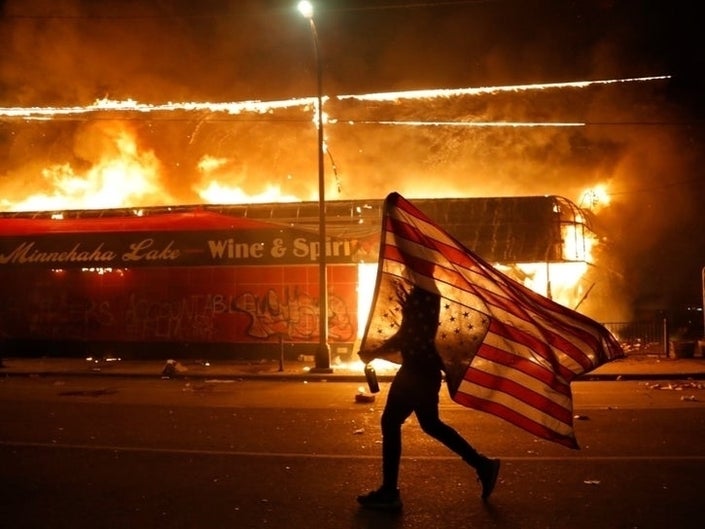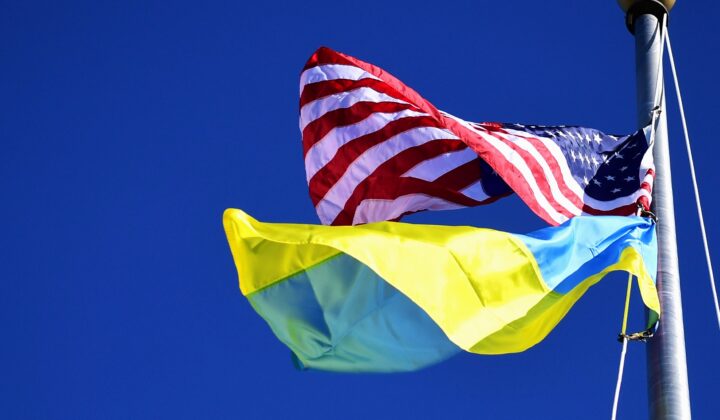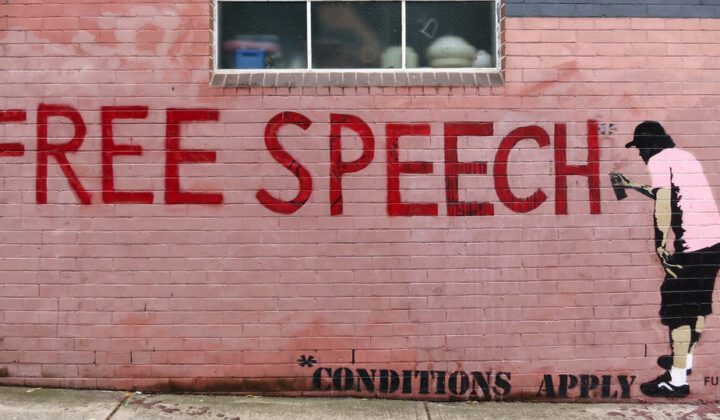America Is on Fire
What started out as peaceful protests after the murder of George Floyd—who died after pleading for his life while white police officer Derek Chauvin knelt upon his neck for over 8 minutes—erupted into riots in Minneapolis last Friday night. Floyd’s murder follows the horrifying, taped execution of Ahmaud Arbury. The protests and riots have quickly spread over much of America, including the cities of Philadelphia, New York, Louisville, Chicago, and Los Angeles, and many more cities have seen looting, arson, and other forms of lawlessness. To restore order, governors have imposed curfews, and over 15 states have called in the National Guard.
Meanwhile, President Trump took to Twitter to say “when the looting starts, the shooting starts,” parroting a racist police chief from the 1960’s. The President has also urged governors to “dominate” citizens with brute force and to use “vicious dogs” to keep protesters at bay. And on Monday evening, he threatened to invoke the Insurrection Act, which would allow him to deploy troops within US borders at a broad scale. A limited number of US troops (a military police unit) has already been deployed to the D.C. area. And on the same night, under Attorney General Bill Barr’s direction, police fired tear gas and rubber bullets at peaceful protesters across the street from the White House.
- What do these events say about our democracy?
Our democracy is in turmoil. The events of the past few days, transpiring against the background of a global pandemic, Depression-era unemployment levels, and repeated attacks on the Rule of Law by the President, have seriously undermined the stability of our society while exacerbating the racial wounds that have been with us since the beginning. Not since 1968, which marked the bloodiest year of the Vietnam War and witnessed the assassinations of Martin Luther King Jr. and Bobby Kennedy, has our Union been in such jeopardy.
First, the murder of George Floyd is yet another illegal killing of a black man by a police officer, part of a pattern of police violence that strikes at the heart of the promises of our foundational documents that ALL human beings are entitled to dignity and equality under the law. And this pattern of violence stands in contrast with the restraint shown by the police last month toward heavily armed white men protesting social distancing guidelines at state capitols.
Second, the lawlessness of recent days represents a real threat to our democracy. The state, which possesses a monopoly on violence on the condition that it offers safety, seems, at times, to have violated this implicit social contract. And the riots are, to a certain extent, a response to this violation. It is no understatement that the rage and despair felt by many black Americans are justified. However, as leaders from John Lewis to President Obama have powerfully stated, riots are not a productive way to focus rage. Rather, they harm the very communities most in need and give ammunition to extremists on all sides and those seeking to divide Americans along racial, social, and political lines.

Trump’s Twitter Tantrum
Last Thursday, President Trump signed an executive order calling for the removal of legal protections for social media companies. The order was signed two days after Twitter’s decision to append a fact-checking label to a false tweet claiming mail-in ballots lead to voter fraud. An additional warning label was added to another one of Trump’s tweet in which he asserted that Minneapolis looters would be shot.
The executive order outlines a proposal to limit the scope of Section 230 of the 1996 Communications Decency Act, which gives social media companies immunity against defamation suits and allows them to restrict content deemed to be “obscene, lewd, lascivious, filthy, excessively violent, harassing or otherwise objectionable, whether or not such material is constitutionally protected.”
The executive order would (1) hold social media companies responsible for content their users publish and (2) prohibit “selective” moderation of content, assuming these companies made such decisions in “bad faith.” Ironically, this change could actually backfire on the President as many people believe his tweets to be defamatory. If Twitter could be held responsible for them, the company might be more likely to regulate them to avoid libel suits.
- Is President Trump’s order unlawful or unconstitutional?
It is unclear if the President’s executive order is even enforceable. He ordered the FCC to interpret the scope of §230 despite the fact that it does not have the regulatory authority to do so. Aside from this, the President’s order is problematic for several reasons. First, Twitter is a private company, not a public square like the President claims. And, therefore, it has wide latitude to regulate content as it chooses. Second, Trump’s order would violate Twitter’s First Amendment rights. By attaching a warning label to Trump’s tweets, Twitter is engaging in political speech. Trump is trying to retaliate against the company for this activity, a serious violation of their First Amendment rights.
Regardless of the legality of the EO, should Congress try to regulate social media?
Arguably, yes, to some extent. There are free speech advocates who claim that social media companies are similar to public squares. However, this characterization does not comport with the fact that these companies have effectively (although not exclusively) become publishers, choosing manually or through algorithms what content gets promoted to almost half of the world’s population. By their very nature, public squares operate on a different scale; you cannot go outside and elevate your voice a million-fold.
What is clear is that a handful of private social media executives increasingly have the ability to influence our democracy in profoundly negative ways. One possible solution could include revising or revoking §230 through Congressional legislation, rather than an Executive Order that further expands the power of the presidency and targets the President’s critics. This would allow social media companies to be subject to similar legal restrictions as newspapers. Regardless of the fate of §230, new legislation should be focused on empowering or incentivizing social media companies to moderate their content in a way that prioritizes a healthy marketplace of ideas and an online world that connects rather than divides. Unregulated pollution of the information ecosystem online destroys our democracy which depends upon informed decisions.

Costa Rica Legalizes Same-Sex Marriage
Costa Rica has become the first nation in Central America to legalize same-sex marriage. The country’s Supreme Court ordered the move in August 2018, when it nullified the legal prohibition of same-sex marriage, a law that the court described as discriminatory. The ruling mandated that the new laws should take effect within 18 months, and they finally did so last week, prompting nationwide celebrations among the LGBTQ community. The moment was labeled a victory for “freedom, equality, and democratic institutions” by President Carlos Alvarado. Costa Rica now joins five other Latin American nations (Argentina, Ecuador, Brazil, Colombia, and Uruguay) in permitting same-sex marriage.
The campaign to further expand these rights in Latin America may face an uphill battle, however, because of the region’s high rates of evangelicalism and social conservatism. And despite Brazil’s tolerant same-sex marriage laws, president Jair Bolsonaro has previously said he would ‘rather have a dead son than a gay son.” Meanwhile, many nearby Caribbean countries, including Jamaica, Barbados and Guyana, still enforce criminal punishments for same-sex relationships. But Costa Rica’s recent success provides a moment of inspiration for other LGBTQ communities, proving that a realization of their rights is within reach.
- What led to this decision?
The issue of same-sex marriage rose to prominence after a landmark ruling by the Inter-American Court of Human Rights in January 2018. The Court declared that all signatories to the American Convention on Human Rights, of which Costa Rica is one, were immediately required to allow same-sex couples to marry. The Costa Rican Supreme Court’s decision 7 months later was in line with that opinion.
This ruling is the culmination of gains made for LGBTQ rights in Costa Rica in recent years. Sexual activity between same-sex couples was not legalized until 1971, and the country’s Supreme Court ruled against same-sex marriage as recently as 2006. But, following a pattern seen in the United States, the government’s position has shifted after increasing public support of same-sex relationships, leading to a steady relaxation of restrictions. In 2013, LGBT couples were permitted to enter into a “domestic partnership,” and in 2018, in the same year that the first openly gay Congressman in Costa Rica was elected, Carlos Alvarado won the Presidency by a wide margin after he declared his support for same-sex marriage. His opponent, Fabricio Alvarado, was strongly against it, and it became a major campaign issue.
- What was the legal basis for the decision?
The Inter-American Court’s decision, which was the basis for Costa Rica’s Supreme Court verdict, argued that any reasonable interpretation of the concept of “family” must encompass same-sex relationships, thus meaning that any rights afforded to heterosexual couples should also be granted to same-sex couples. This adds to the growing body of legal precedent around the world legalizing gay marriage. In 2015, the US Supreme Court declared that the fundamental right to marry is guaranteed to same-sex couples under the Due Process and Equal Protection Clauses of the 14th Amendment. Hopefully, other countries can look to these two Supreme Court rulings, as well as many others, for both the legal and moral inspiration to prohibit LGBQT discrimination.

VoteSafe Protects Democracy
In response to the serious threat of coronavirus to November’s national elections, two former state governors have formed VoteSafe, a non-partisan advocacy group that fights to ensure that voters can safely cast their ballots. Governors Tom Ridge (R-PA) and Jennifer Granholm (D-MI) are working together to expand mail-in voting and maintain safe, sanitary polling stations around the country. In an open letter, Ridge and Granholm urged state election administrators to join their mission and transcend partisanship in the name of “protecting the sacred American right to vote.” VoteSafe has already been endorsed by a bipartisan group of state leaders, including the Secretaries of State of Georgia, Washington, Michigan and Connecticut.
- Why is VoteSafe important?
America is woefully unprepared to administer a pandemic-affected election, with 16 states having already postponed or cancelled their primaries. While Congress has passed a stimulus package guaranteeing $400 million to better protect voters, voting experts and leading Democrats have argued that at least $2 billion is required (for, amongst other measures, new polling booths and online voter registration sites). Meanwhile, the President has frequently undermined efforts to expand mail-in voting, arguing that it would mean that “whoever cheated the most would win” (Twitter issued its first-ever “fact check” of the president over this matter). In response, VoteSafe has provided much-needed facts about mail-in voting, citing extensive research and polling to show that it is “a safe and secure method” that does not “advantage one party over the other.”
It is vital that action towards expanding voting options happens now, because there are many logistical hurdles to implementing vote-by-mail that require extensive planning to address. For example, many states do not even have the online infrastructure for citizens to request absentee ballots. States must also be able to mail all registered voters with a ballot, and provide enough ballot drop boxes for citizens to easily submit their vote. VoteSafe has recognized that action needs to be taken now and has told election administrators that “time is running out” to make the necessary changes to voting. In doing so, it is promoting non-partisan values that are crucial to ensuring a safe, fair general election in the fall.
- Who else is taking action to expand the use of absentee ballots?
VoteSafe has joined a number of other organizations mobilizing nationwide to defend our elections. The cross-partisan advocacy group Unite America has formed the Vote At Home Election Integrity Fund, a group that provides crucial policy expertise and urges governors nationwide to expand mail-in voting. Other organizations such as Rock the Vote have launched a collaborative virtual campaign, which aims to register up to 200,000 new voters. Importantly, we have also seen significant political steps in support of mail-in voting. Since the beginning of the pandemic, 12 governors (including 7 Republicans) have eased restrictions for mail-in voting for their state, and all but four states now allow voters to mail in their ballet. Along with groups like VoteSafe, this coalition of activist groups and leaders are doing all they can to ensure that all Americans can exercise their constitutional right to vote in November.





